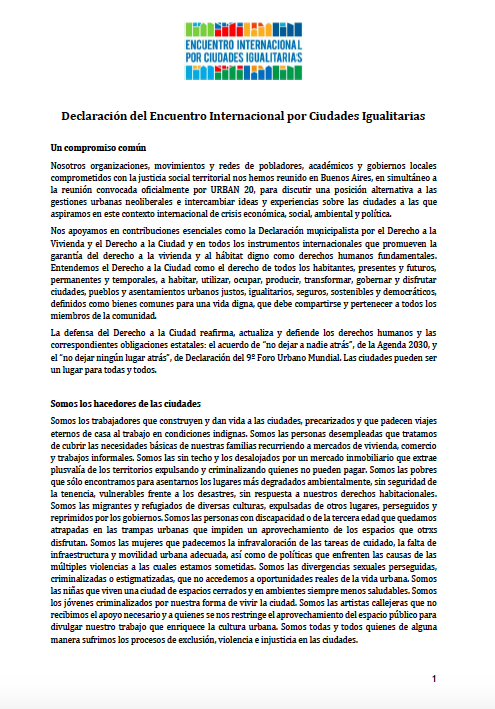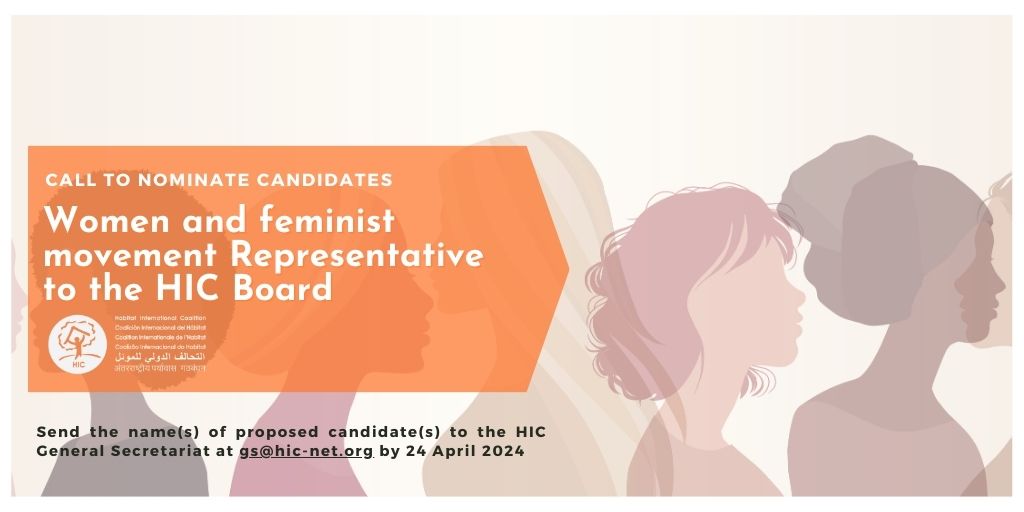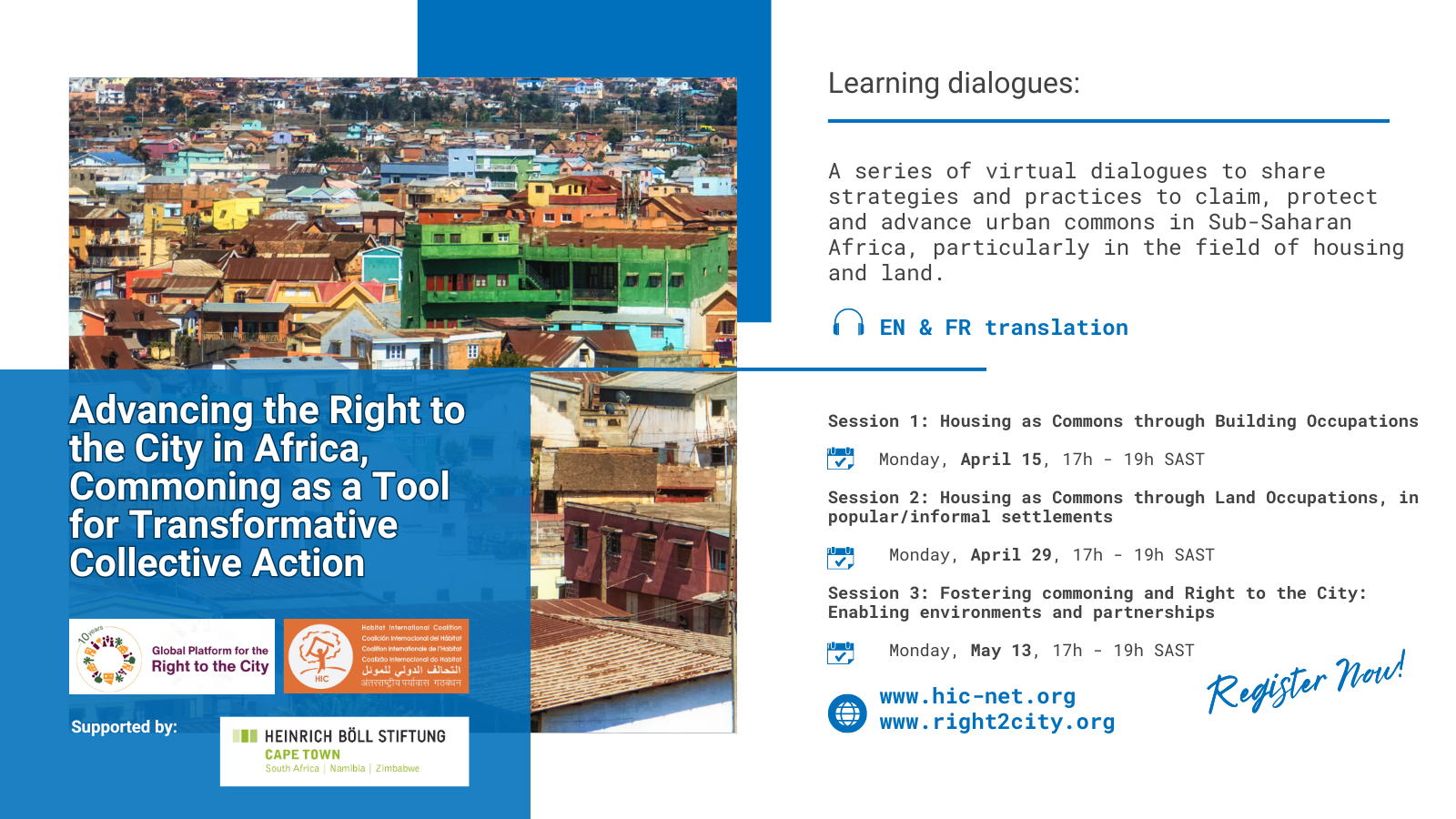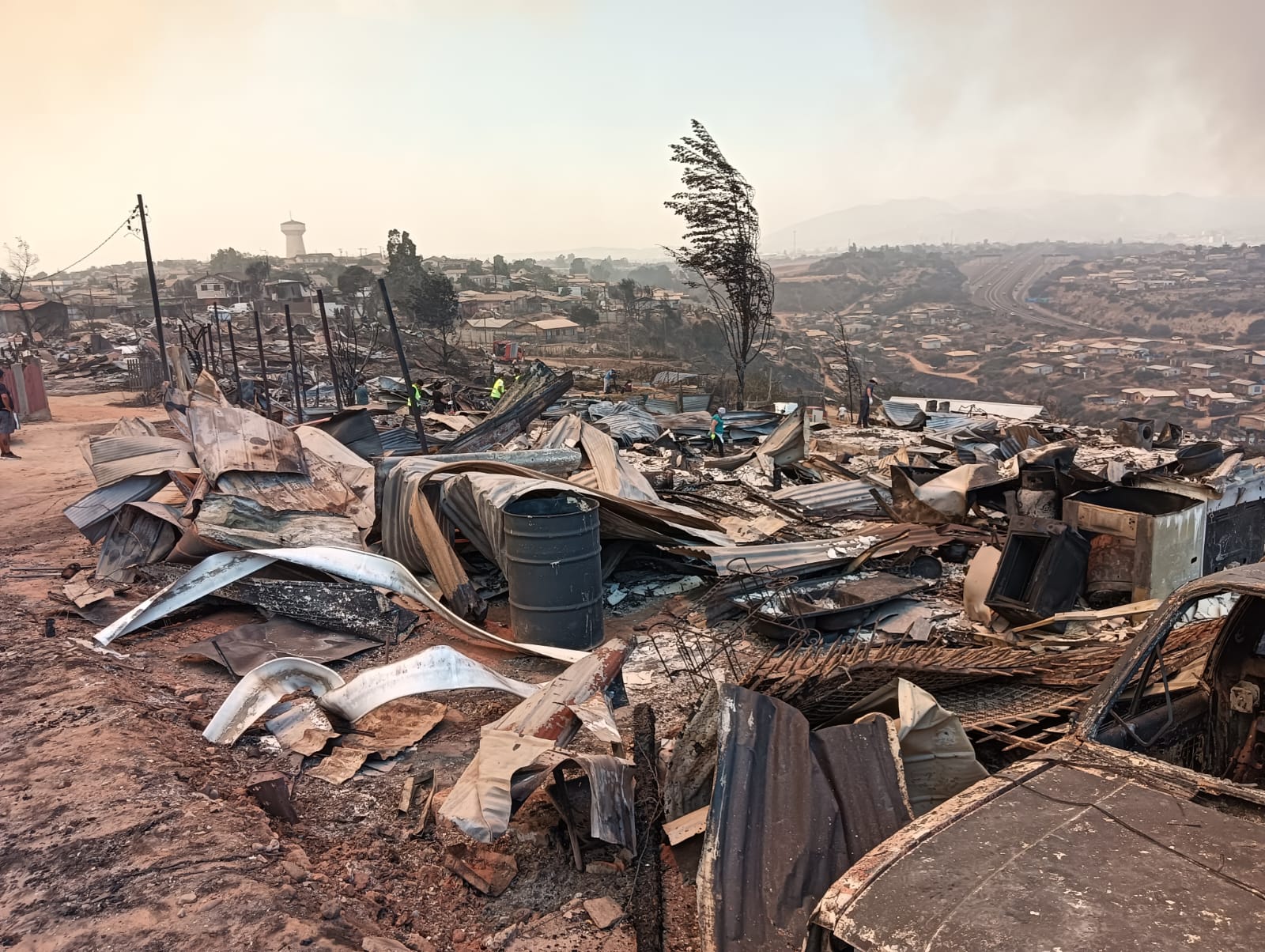Background
The struggles around economic integration and globalisation are growing in momentum just as economic injustices become increasingly acute and visible. In this political climate, governments, international financial institutions and corporations have adopted, in most cases, a gender-neutral version of equality that treats economic policy as though it is completely unrelated to the advancement of womens rights. A gender-neutral approach distorts reality and fails to frame womens issues in the context of inequality and discrimination. Women of all ages experience inequalities within and outside their homes. Women constitute 70% of the worlds poor and two-thirds of the worlds illiterate. Women are continually denied access to basic healthcare, housing, education and work. Moreover, they suffer from the burdens imposed by gender-based hierarchies and subordination that restrict them from enjoying their human rights.
In recent years, people across the world, particularly those most vulnerable to ESCR violations are increasingly demanding ESCR for themselves, for their families and their communities. Human rights mean little if individuals do not have economic autonomy. Womens oppression and the dominance of patriarchal structures, whether within the family or in community, is sustained largely because of their lack of access to economic and social resources. In todays social, economic and political climate, there is a danger that human rights may slide into irrelevance unless they are understood by women, and recognized by governments, courts and corporate actors to have content that can address the threats to women’s advancement that neo-liberal economic policies and discriminations within home, communities and societies currently pose.
Gaps in womens human rights
The womens international movement(s) has advanced predominantly along two frameworks human rights and development. Over the years, the womens human rights field focused on two main issues violence against women (VAW), and sexual and reproductive rights.. Women and development became compartmentalized into development discourses. When one thinks of womens human rights issues, one usually thinks about VAW and not about poverty, housing, unemployment, water, food security, trade, and other related ESC issues. Women for many decades, however, have organized around basic economic survival issues such as food, employment, health, housing, and education. Within the womens human rights field, the success of work against gender violence and of sexual and reproductive rights led to isolation of these issues as womens only problems and as only womens problems.
PWESCR will build on existing work that links VAW to the right to adequate housing in order to expand a gender-based analysis to other ESC rights. It will explore ways to develop a gendered understanding of a few ESC rights, such as right to food, right to health, right to land and adequate housing, and right to work. At the same time, the programme will seek means to link the human rights framework to the extensive feminist scholarship and activism around economic and social justice issues. Working in collaboration with its partners, the programme will aim to increase the use of human rights mechanisms by womens groups, networks and social movements to promote their causes.
Gaps in the field of ESCR
Most mainstream work on ESCR continues to follow a gender-neutral approach. The bulk of the activities and literature on ESCR produced by NGOs and academics pays very little attention to womens experiences in this field. Women, if included, are limited to vulnerable groups or to specific thematic programmes. A focus on womens rights without an understanding of the social construction of gender, will always be limited. Drawing on critical feedback from womens rights advocates regarding the newly launched ESCR-Net [4] and its inaugural conference, we have realized that there is a need to build and strengthen the field of gender and ESCR. Although the conference brought together a significant number of women, it nevertheless fell short in making gender analysis and concerns an integral part of its core agenda. Such a phenomenon is not an isolated oversight, but highlights a much greater need to develop an integrated approach to gender equality in the field of ESCR.
HLRN an international ESCR network itself as the host organization for PWESCR will serve as a natural link between the work on womens human rights and the work of other human rights organizations. Such collaborations will help advance gender analysis in the dominant ESCR discourses and hopefully help close some of these gaps. Building on HLRN experiences and findings from regional consultations on linking VAW and womens right to adequate housing, the new programme will explore such strategic linkages and future partnerships.
Over the years, human rights have become very elite and legalistic, a field dominated by lawyers and technocrats and has marginalized grassroots activists. Human rights work in several areas tends to limit itself to the pursuit of legal rights and the area of law. The challenge is to expand this activism and scholarship and link it with the work of grassroots human rights groups and peoples rights-based movements. PWESCR will prioritise the implementation of human rights, explore alternative to legal strategies, research best practices globally, and develop effective models in the region.
Collaboration and Linkages
Womens rights are indisputably interconnected. For example, in order for women to enjoy their right to adequate housing they also need to be free from violence and have access to healthcare, education and decent work. A womans rights to housing are linked to all of her other human rights. Women globally are engaged in promoting womens ESCR. However, in absence of coordinated global strategies, common agendas, shared resources and skills, the impacts are limited. There is a critical need to network, build capacity, develop leadership, promote a gender analysis for ESCR advocates, and create tools to raise awareness around womens ESCR. PWESCR will build on existing activism and scholarship to develop a shared agenda in collaboration with its partners. The new programme will facilitate collaboration between various networks and organizations to work at all levels. While they originate from different premises and adopt different strategies, there is value in the different sectors supporting each others advocacy for womens rights when addressing common issues such as poverty and gender discrimination. For example, collaborations between feminist economists and human rights groups can add value to both frameworks. The new programme on gender and ESCR will aim to bring together different activists to explore alternative strategies to develop a shared framework and vision.
Linking various UN human rights bodies
Lack of effective participation of womens advocates at the Human Rights Commission and UN Treaty Monitoring Bodies (except the Convention on the Elimination of Discrimination Against Women – CEDAW) are some other glaring gaps in the human rights field. It is very useful to gain new perspectives on old concerns by recognizing the inter-relationship between womens rights, access to justice, the rule of law, poverty reduction and sustainable development. Furthermore, recognizing that international treaties and conventions (such as CEDAW) that promote gender equity also indirectly assist in reducing poverty, improving womens access to justice and promoting economic development. On the other hand, the International Covenant on Economic, Social and Cultural Rights (ICESCR) allows for a more comprehensive analysis of the issues and therefore helps in the development of remedies/preventive actions. In order to promote womens human rights, it is therefore important to engage not just with CEDAW but also with other human rights bodies. PWESCR will provide human rights education and training to enable participation in the monitoring of human rights bodies in addition to CEDAW. In addition, PWESCR will explore ways to work with various UN special rapporteurs to strengthen the human rights system in general. PWESCR being housed at HLRN South Asia Regional Programme, with Miloon Kothari, the UN Special Rapporteur on the right to adequate housing, as the Coordinator, is well setup to do so.
Need to develop International Organizations in the Global South
Historically, the international human rights field for the most part has been dominated by actors and organizations from the North with South based NGOs mainly providing data that is utilized by the Northern NGOs to influence Southern governments and international governmental organizations (IGO). However, in the last decade with an emergence of Southern leadership and organizations in the international arena, the Global South no longer needs Northern counterparts the same way to dialogue with governments and IGOs. It is also important to recognize that Northern and Southern human rights priorities are often different. The most promising endeavours are those that try to actively engage all key stakeholders in peer exchange processes. Moreover, South-South alliances are important to confront Northern patterns in global economic and political fields. For example, at the 2003 WTO Ministerial in Cancun, Southern NGOs worked together with their own governments to denounce international bodies. This perhaps might be the most promising change in this field. Similar positive developments are also happening in the womens human rights field. However, there is a need to continue to develop international organizations and leadership in the Global South. PWESCR, as an international programme based in India with a regional implementation focus will prioritize networking, capacity-building and leadership development of Southern organizations and encourage South-South exchanges and alliances in all its work.
Objectives of PWESCR
To promote womens human rights, especially in the context of economic, social and cultural rights by bringing a gender framework to policy, law and practice at local, national, regional and international levels through ever-evolving strategies and activities in both conceptual and practical realms.
PWESCR is organized around two broad goals:
-
To build leadership and capacity of groups, organizations, activists and other actors in the field of human rights and economic justice to promote womens ESCR;
-
To establish links and foster collaborations in order to enhance learning, as well as develop shared strategies to advocate problem-solving alternatives at all levels in the context of gender.
PWESCR will work within the following principles:
-
All human rights are universal, indivisible, and interdependent. Civil and political rights are interdependent on economic, social and cultural rights and vice-a-versa.
-
Womens economic and social empowerment is key to the full realisation of womens human rights.
-
Gender analysis is crucial to advance all ESCR.
-
Human rights mechanisms are an organizing, mobilizing and empowering tool in addition to an international legal framework.
-
An inter-sectional analysis ensures that women from marginalized communities are not left behind.
Planning Process
The overall goal in the upcoming twelve months is to undertake an in-depth mapping of the field of ESCR in the context of gender in the South Asian region. Identifying key partners, developing new resources, promoting linkages, and building networks are integral to this exploration. This will be carried out as follows:
Survey: The proposed exploration will critically review the field of ESCR regionally, with a particular focus on gendered understandings of these rights. It will provide in-depth information on who is working on what issues, and what their immediate needs are. The survey will result in recommendations regarding assessment of needs, trends, priorities and new agendas to focus more effectively upon strengthening womens ESCR. This detailed mapping will also provide a good sense of what skills, resources and capacities are available in the region to do this work. The proposed exploration will also identify and develop strategic partnerships with individuals and organizations promoting ESCR and/or womens rights at all levelslocal, regional and international. These partnerships will be crucial to the growth of PWESCR. International NGOs such as International Women’s Rights Action Watch – Asia Pacific (IWRAW-AP) and Latin American and Caribbean Committee for the Defense of Womens Rights (CLADEM), regional NGOs such as Asia Pacific Forum for Women in Law and Development (APWLD), and national and grassroots organizations such as MASUM and National Campaign for Dalit Human Rights are some organizations that have expressed interest in being our potential partners.
Working Group and Advisory Board: The proposed planning process will engage leaders from all levels of activism in the region to develop conceptual frameworks and new approaches and strategies to promote gender in ESCR. Any frameworks and ideas that emerge would reflect womens realities at all levels. For this purpose, the programme will identify 8-10 prominent women leaders in the region to form a working group. The members of this working group will commit to two meetings over the next 12 months. This format should allow for engaged conversation among the key leaders. These meetings will build on the findings from the regional survey, other international conversations, and previous meetings. The meetings would explore ways to strengthen standards within the human rights framework, particularly in terms of how gender equality and gender non-discrimination apply to specific rights. The working group would help identify priority issues and develop a common education and mobilization agenda that will be circulated in the form of an action plan. These conversations and findings will be captured and published in a report that would distil important themes, trends and lessons from the field. The programme will engage a rapporteur to document the process and the outcomes of the research and meetings. The report will be widely distributed among advocates and organizations working to promote ESCR. After the planning process, some of the working group members will transition to form the Advisory Board for the PWESCR.
Resource: After a thorough research on existing resources, PWESCR in collaboration with its partners will develop materials and tool kits to build capacity by organizing trainings on women and ESCR for NGOs, advocates, and governments. It will also develop easy-to-use fact sheets around ESCR from a gender perspective. The programme will also act as a clearing-house of information for local groups. It will monitor ESCR issues at all levels and eventually maintain a website as a resource tool.
Gender and Cultural Rights: One of the key needs clearly identified by women advocates at the Goa meeting on, Gender in ESCR, was in the area of cultural rights. The meeting participants felt that women all over the world face oppression in the name of culture and religion. Feminists, however, have stayed shy of the issue. There is a need to develop conceptual frameworks as well as practical strategies to address these violations. PWESCR in the next 12 twelve months will coordinate an expert group that will be responsible to explore strategies to address this need. Some of the participants at the Goa meeting expressed interest in being part of this group. The planning phase will involve brainstorming with some of our other partners to explore how a human rights framework can be helpful in developing positive alternatives for culture.
If you would like be part of PWESCR or would like more information please contact Priti Darooka at pdarooka@hic-sarp.org or 91 (0) 11 24356775.




